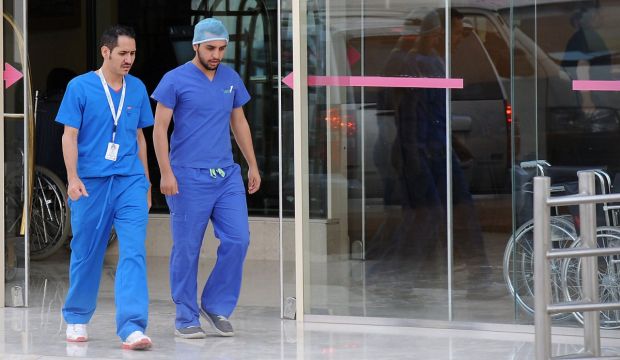
Saudi medical staff leave the emergency department at a hospital in the center of Riyadh on April 8, 2014.
(AFP Photo/Fayez Nureldine)
Riyadh, Asharq Al-Awsat—The Gulf Cooperation Council (GCC) group of states moved closer to establishing a unified healthcare system following a meeting of GCC health ministers in Riyadh earlier this week.
The GCC’s 78th Health Minister’s conference began on Wednesday in Riyadh and saw Gulf health ministers put forward a number of recommendations to standardize healthcare across GCC states, including the introduction of a unified smart card system that would provide GCC residents with healthcare coverage in any GCC state.
Speaking to Asharq Al-Awsat, Director-General of the Executive Board of the GCC’s Health Ministers Council Dr. Tawfiq Khoja said that the GCC is in the final stages of completing the smart card system and implementing a joint mechanism for healthcare, adding that the organization is waiting for formal confirmation of the shared venture from each GCC health minister.
Khoja refused to speculate on when the joint healthcare system would go ahead, adding that the GCC health ministers had discussed various details of the proposed system during the conference and would return to their home countries for further consultations.
Khoja, who was re-elected as director-general of the executive board of the GCC’s Health Ministers Council for another three year term, said that the GCC could seek to launch a small-scale pilot project before introducing the system across the entire region.
The move to unify healthcare across GCC states—Bahrain, Kuwait, Oman, Qatar, Saudi Arabia and the UAE—comes amid a general move for closer cooperation and coordination among Arab Gulf states, including talk of a Gulf Union.
The two-day GCC health ministers conference also recommended the approval of other health projects, including a 10-year GCC project to fight non-communicable diseases, as well as measures to adopt World Health Organization (WHO) standards on healthcare and efficiency and another program seeking to curb smoking among GCC citizens.
Saudi King Salman Bin Abdulaziz met with the GCC health ministers in Riyadh on Thursday following the end of the two-day conference, during which he welcomed their efforts on behalf of GCC healthcare and called for them to “meet the aspirations of GCC heads of state to provide excellent healthcare to GCC residents.”
